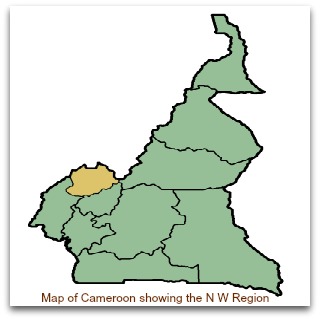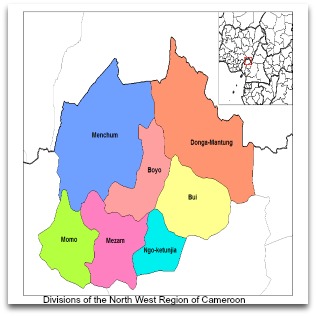The North West Region of Cameroon
The Northwest Region of Cameroon is one of the Regions found in the territory of Cameroon.
Geographically, the region is part of the territory of the The Southern Cameroons, located in the Western Highlands of Cameroon, bordered to the southwest by the South West Region, to the south by the West Region, to the east by the Adamawa Region and to the north by the by the Federal Republic of Nigeria.
 |
Known before 2008 as the Northwest Province, the region is the third most populated in Cameroon. It has a major metropolitan city, Bamenda, and several other smaller towns such as Wum, Kumbo. Mbengwi, Batibo. Nkambe, Ndop, Bambui etc.
It has seen an increase in its population from approximately 1.2
million in 1987 to an estimated 1.8 million in 2010. The provincial urban growth rate is 7.95%, higher than the national
average of 5.6%, while the rural growth rate, at 1.16%, is equal to the national
rate.
According to the Statistical Provincial Services of the region, the population is young, and 62% of its residents is
less than 20 years old. Therefore, the dependency rate in the province is high,
particularly in the rural areas.
Northwest Region is noted for many ethnic groups, with immigrants from other regions and countries inclusive. The native population comprises a variety of ethnic and linguistic groups. Main ethnic groups are of Tikar origin( Tikari, Widikum, Fulani and Moghamo).
The most spoken languages in this Region are; Mungaka, Limbum spoken by the Wimbum people of Donga Mantung Division; Yamba, spoken by the Yamba people and Donga Mantung Division; Bafmen, Oku, Lamnso, Ngemba, Pidgin English, Balikumbat, Papiakum, Moghamo and Nkom.
Social organization in this Region recognizes a chief as its head (Fon). The Fons, who in their tribal areas may be more influential than the official administrative authorities, are considered the living representatives of the tribal ancestors.
Administratively, the Region is controlled by a governor. The North West Region is made up of seven divisions; Mezam, Momo, Bui, Donga-Mantung, Menchum, Boyo and Ngoketunjia Division.
It is further divided into thirty one subdivisions with the basic unit of government being the local councils.
 |
The North West Region of Cameroon: Economy.
In terms of economy, the Region is predominantly agricultural.About 80% of the rural population depends solely on agriculture and a strong livestock sub-sector.
Food crops include rice (mostly in the Ndop Plain), potatoes (in Bui and Mezam Divisions), and beans (from throughout the province)Maize, plantains, cocoyams cassava and yams are also produced.
Cocoyams (used for Achu) a staple for the Ngemba people and a widely consumed delicacy. Groundnuts, mostly from Esimbi, is also widely produced.
Also, the Region is a major producer of palm wine, and the town of Batibo the palm wine capital of Cameroon. However, wine production in Batibo, though distributed across the country, is not produced in an industrial scale due to low technology
Industrial Development of the Region
Few industries exist in the Northwest Region, limiting the number of people being employed. Apart from soap production, agricultural processing is the area's major industry and local crafts production of various works of art such as wood, weaving, and pottery.
Fabrication of agricultural tools is now less significant. The Region also has many markets, many banks for business transactions and offices.
Political Development
The North West Region is a stronghold of the Social Democratic Front, being the main opposition party of Cameroon. There is also a secessionist movement, the SCNC (Southern Cameroon's National Council) whose goal is to secede from Cameroon and form a republic consisting of the English-speaking regions. Much of the SCNC's influence exists in the Northwest.
In 2008, the President of the Republic of Cameroon, Paul Biya, signed decrees abolishing "Provinces" and replacing them with "Regions". The Northwest Province subsequently became the Northwest Region.
Tourism-Attractions
Natural attractions in this Region are unique. There are many crater lakes such as Lake Oku, Lake Awing, and Lake Nyos. The largest remaining mountain forest in the Northwest Region is the Kilum-Ijim Forest. Menchum falls and Abbi falls are also located here.
In Bamenda which is the capital of the Northwest Region of Cameroon, there are cultural sites such as the Mankon Fon’s Palace with its museum, and the Bali Fon’s palace with its ancient architectural structures.
The mountainous terrain around the city affords scenic views such as that from the mountain Sabga over the Ndop plain.
Health and Safety
In the Medical sector, the principal public hospital for the Province is the Bamenda Provincial Hospital.
The Shisong Hospital, as well as other private and mission hospitals, have helped to resolve the health needs of the region
The People and Religion
North-westerners have diverse religious background categorized into 3 groups – Christians, Muslims and Traditionalists. The different religious bodies found within the council area are Christianity (Baptist, Catholic, Presbyterian, Apostolic, Full Gospel, and Pentecostal); Muslim; and Traditional.
Education
In educational domain, many primary and secondary schools with universities such as st Louis university institute of Health and Biomedical Science and Catholic university of Bamenda both private and governmental, these helps the inhabitants of the Region to be educated.
Transportation
The city of Bamenda has road links to Yaoundé and Douala, as well as a rarely used airport (Bali airport). North of the city is the Bamenda Ring Road, a 367 km (228 mi) circular route through some of Cameroon’s most spectacular mountains. Along this road is Mount Oku (3,000 m/9,800 ft), the Kimbi River Game Reserve, the Menchum River waterfalls, a huge chief’s palace at Bafut, and a pyramidal thatched shrine at Akum (also known as Bagangu).
Click here to leave the North West Region of Cameroon to our home page